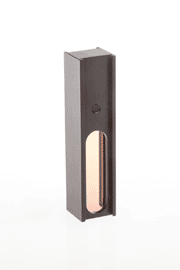
For assessing the wavelength accuracy of your spectrophotometer

| Description | Didymium glass filter |
|---|---|
| Primary Usage | Verify the wavelength scale of Visible spectrophotometers |
| Useable Range | 430nm to 890nm, instruments with SBW of less than 10 nm |
| Physical Configuration | Stress Free glass filter mounted in anodized an aluminum holder |
| NIST Traceability | Each set is supplied with a Certificate of Analysis and NIST Traceability |
| ISO Accredited | Accredited by UKAS ISO 17025, ISO Guide34 and ISO 9001 |
Product Description
View/Download Comprehensive Data Sheet for Didymium Glass Reference
Like its liquid counterpart, the didymium glass filter produces characteristic peaks that make it suitable for use as a wavelength reference in the high end visible to near IR region. As a solid reference material, the Starna didymium glass filter is more robust than the liquid cell as it is mounted in an anodized aluminum housing to offer greater protection.
Starna certifies each filter significantly reducing the uncertainty caused by variations in peak positions (observed from melt to melt of the glass) to acceptable levels (Â ± 0.2 nm).
The Starna didymium reference is used to assure that the wavelength scale of your instrument is within the manufacturers tolerances to the actual wavelength being measured. The use of the didymium glass reference filter assures that the optical configuration of your quality control is exactly the same as for a normal analysis.
Certified SBW and Wavelengths
SBW |
nm |
nm |
nm |
nm |
nm |
nm |
nm |
nm |
nm |
nm |
nm |
|---|---|---|---|---|---|---|---|---|---|---|---|
0.10 |
879.40 |
805.40 |
748.82 |
741.63 |
684.62 |
587.44 |
574.35 |
528.93 |
513.35 |
481.13 |
440.30 |
0.25 |
879.40 |
805.36 |
748.52 |
741.05 |
684.59 |
587.06 |
573.09 |
528.93 |
513.47 |
481.08 |
440.40 |
0.50 |
879.30 |
805.74 |
748.62 |
741.15 |
684.47 |
587.01 |
573.03 |
528.91 |
513.36 |
480.99 |
440.50 |
1.00 |
879.36 |
805.48 |
748.54 |
741.07 |
684.53 |
587.39 |
573.07 |
528.99 |
513.51 |
480.99 |
440.38 |
1.50 |
879.44 |
805.52 |
748.58 |
740.70 |
684.62 |
587.16 |
573.19 |
528.95 |
513.37 |
480.92 |
440.50 |
2.00 |
879.44 |
805.46 |
748.59 |
740.46 |
684.55 |
587.34 |
573.32 |
528.92 |
513.51 |
480.75 |
440.41 |
3.00 |
879.36 |
805.48 |
748.54 |
741.07 |
684.53 |
587.39 |
573.07 |
528.99 |
513.51 |
480.99 |
440.38 |
Suggestions for Use
Didymium presents a wide range of crisply resolvable peaks which are easily used to correlate the wavelength indicator on your spectrophotometer to the known Didymium peaks.
The initial procedure after receiving the reference should be to scan the filter over the useable
range to assure that all of the peaks can be resolved. Alter the slit width and scan
rate to produce a useable spectra. Check each peak to assure that the reading on
your spectrophotometer is within the manufacturer's tolerances for the
wavelength of your spectrophotometer. If not, have a service technician check and, if necessary, adjust your instrument. Didymium is measured against
an air blank.
Periodically check the spectra, at a minimum in the area where you are
doing your analysis. The periodic use of your Didymium filter will build a log
of your instrument's wavelength accuracy for use with certification and
troubleshooting should the correlation change over time.
Absorbance Scan of Didymium Glass

Transmission Scan of Didymium Glass

Interpretation of Results
Consult your spectrophotometer's reference manual for the specification of your instrument's wavelength scale tolerance. This figure will be listed as a plus and minus (+/-) number in nanometers (nm). Add your instrument's wavelength tolerance to the confidence limit on the certificate supplied with the Didymium wavelength reference. Compare the peak wavelength values measured on your instrument with the expected values calculated from your instrument mannual and the NIST traceable certificate. If the readings are within the expected range for your instrument, then your wavelength scale is correct. If not, consult your service technician and have your instrument evaluated.
Quality program
Each time that the analysis is repeated you can compare the new results with the previous results to check for any variance. If your instrument needs service because of a change in resolution, the historical data will greatly assist the service technician.
How to Order
| Catalog Number | Description |
|---|---|
| RM-DG | Wavelength Reference, Didymium Glass, NIST traceable and ISO 17025 |
Download MSDS Sheet for Didymium Glass Reference